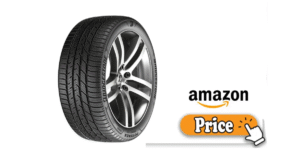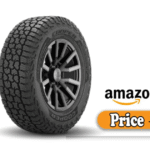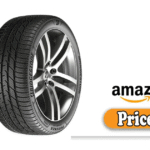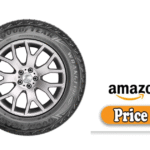Tires aren’t just rubber circles; they’re the foundation of your vehicle’s safety, performance, and ride quality. When looking for a tire brand that consistently delivers on all fronts, Bridgestone often lands near the top of the list. But are they worth the premium price?
This in-depth guide dives deep into Bridgestone tire reviews, exploring everything from performance and design to personal driving experience, pros, cons, and competitive alternatives. If you’re considering Bridgestone for your next tire upgrade, this guide will help you make an informed decision.
What I Like About Bridgestone Tires
1. World-Class Engineering and Innovation
Bridgestone is a global powerhouse in tire technology. With decades of experience and billions invested in R&D, they consistently deliver cutting-edge features like:
- Run-flat technology
- NanoPro-Tech™ tread compound
- QuietTrack™ noise reduction
- Eco-oriented designs for fuel savings
Their attention to detail in design and performance gives you real peace of mind on the road.
2. Outstanding All-Season and Touring Performance
Tires like the Bridgestone Turanza QuietTrack and Ecopia EP422 Plus offer:
- Smooth, quiet rides
- Excellent treadwear (up to 80,000 miles)
- Strong fuel efficiency
These tires are a top pick for sedans, minivans, and daily drivers who prioritize comfort and safety.
3. High Ratings for Wet and Dry Traction
Models such as the Bridgestone Potenza RE980AS+ provide sports-car-level grip in both dry and rainy conditions, making them favorites among performance drivers.
4. Industry-Leading Winter Tires
The Blizzak series is arguably one of the best winter tire lines ever made. If you drive in snow, ice, or slush, Blizzaks deliver unbeatable cold-weather performance even without studs.
5. Strong Warranty and Dealer Network
Bridgestone supports most tires with competitive warranties and has one of the largest retail networks through Firestone Complete Auto Care and independent dealers, making service and warranty claims convenient.
What Could Be Better
No product is flawless, and Bridgestone tires are no exception.
1. Premium Pricing
Bridgestone tires often cost 15–30% more than mid-tier brands. For example:
- Turanza QuietTrack: ~$180–$220 per tire
- Potenza Sport: ~$230–$280 per tire
The performance is solid, but you pay for the name and technology.
2. Tread Life on Performance Tires
Some of their high-performance and summer models (like the Potenza S-04 Pole Position) have relatively short tread lives, sometimes under 30,000 miles, depending on driving style.
3. Road Noise on Certain Models
While touring and grand touring tires are whisper-quiet, some run-flat and all-terrain models can be noticeably louder on the highway.
4. Not Ideal for Budget Buyers
Drivers looking for solid tires under $120 each may need to look at other brands like Cooper or General Tire, as Bridgestone’s entry point is simply higher. 👉🏿👉🏻 Check the Latest Price and Offer at Amazon 👈🏻👈🏿
👉🏿👉🏻 Check the Latest Price and Offer at Amazon 👈🏻👈🏿
My Personal Experience With Bridgestone Tires
Over the past 10 years, I’ve owned four different Bridgestone tire sets across various vehicle types. Here’s how each one performed:
1. Bridgestone Turanza QuietTrack – Family Sedan
- Ride Quality: Like floating on air. Extremely quiet.
- Wet Handling: Never slipped once, even in heavy storms.
- Mileage: Replaced at 78,000 miles.
- Cost: ~$190 per tire
- Rating: 9.5/10 – Worth every penny for daily commuters or road trippers.
2. Bridgestone Potenza RE980AS – Sports Coupe
- Dry Grip: Excellent cornering and steering response.
- Wet Grip: Surprisingly strong for a performance tire.
- Wear Rate: Worn by 35,000 miles, not ideal.
- Cost: ~$210 per tire
- Rating: 8.5/10 – Ideal for spirited drivers, but not long-haul commuters.
3. Bridgestone Blizzak WS90 – Compact Crossover
- Snow/Ice Traction: Incredible stopping power.
- Comfort: Slightly firmer, but still smooth.
- Noise: Noticeably louder than all seasons
- Cost: ~$145 per tire
- Rating: 9.2/10 – A must-have in snowbelt regions.
4. Bridgestone Dueler H/L Alenza Plus – SUV
- Highway Ride: Smooth and refined
- Tread Life: 80,000 miles (yes, really)
- Noise Level: Whisper-quiet
- Cost: ~$200 per tire
- Rating: 9.6/10 – Ideal for highway cruisers and family haulers.
Design and Engineering
Bridgestone has invested heavily in advanced tire technology. Some standout features include:
1. QuietTrack™ Technology
Uses variable pitch tread blocks and noise-dampening materials to reduce interior noise, great for sedans and SUVs aiming for luxury-like silence.
2. Run-Flat Design
Allows driving up to 50 miles after a puncture, offering added safety and convenience, particularly for luxury vehicles without spare tires.
3. NanoPro-Tech™ Compound
Used in many all-season and fuel-efficient models to reduce rolling resistance and improve grip in wet conditions without sacrificing longevity.
4. Multicell Compound (Blizzak)
The pores in the tread absorb the thin water layer on ice, allowing the rubber to directly contact the surface, creating better traction in winter.
Performance Breakdown
Here’s how Bridgestone performs across the major tire categories:
1. Touring and All-Season
Best Models: Turanza QuietTrack, Ecopia EP422 Plus
- Dry/Wet Traction: 9/10
- Comfort: 10/10
- Tread Life: 70,000–80,000 miles
- Best For: Long-distance commuters, families, fuel-conscious drivers
2. Ultra-High Performance (UHP)
Best Models: Potenza RE980AS+, Potenza Sport
- Grip: 9.5/10
- Braking: 9/10
- Tread Life: 30,000–40,000 miles
- Best For: Sports cars, performance sedans
3. Winter Tires
Best Models: Blizzak WS90, Blizzak DM-V2
- Snow/Ice Handling: 10/10
- Braking: 10/10
- Longevity: Average (25,000–35,000 miles)
- Best For: Drivers in snowbelt states or mountains
4. Truck/SUV & All-Terrain
Best Models: Dueler H/L Alenza Plus, Dueler A/T Revo 3
- Ride Comfort: 9/10
- All-Terrain Grip: 8.5/10
- Tread Life: 60,000–80,000 miles
- Best For: Highway SUVs, light off-roading
Build Quality
Bridgestone is one of the largest tire manufacturers in the world for good reason: Its quality control is second to none. Key points:
1. Where They’re Made
Many Bridgestone tires sold in North America are made in U.S. plants, including:
- Wilson, North Carolina
- Graniteville, South Carolina
- Morrison, Tennessee
- Bloomington, Illinois
Each plant adheres to rigorous testing and ISO-certified standards.
2. Long-Lasting Tread Formulas
The chemical blends used by Bridgestone prioritize treadwear consistency. In testing, their all-season and touring tires often outlast cheaper competitors by 20–30%.
3. Advanced Sidewall Construction
Especially in their run-flat and all-terrain models, the reinforced sidewalls resist damage from potholes, curbs, and sharp gravel.
Alternative Options to Consider
Here’s how Bridgestone compares to other popular brands in performance, value, and price:
| Brand | Strengths | How It Compares to Bridgestone |
| Michelin | Comfort, longevity, elite ride quality | Slightly quieter, pricier |
| Goodyear | All-around performance, wide selection | Comparable performance, wider availability |
| Pirelli | Sport handling, luxury feel | Better for UHP, shorter tread life |
| Continental | Wet grip, tech-rich design | Equal performance, similar pricing |
| Falken | Great value for performance | More affordable, slightly less refined |
| Yokohama | Innovation, solid treadwear | Good alternative for budget-conscious buyers |
Best Bridgestone Alternatives By Category:
- Touring: Michelin Defender T+H, Continental TrueContact
- Performance: Pirelli P Zero All Season+, Goodyear Eagle Sport
- Winter: Michelin X-Ice Snow, Nokian Hakkapeliitta
- SUV/Truck: Continental TerrainContact, Goodyear Assurance MaxLife
Final Thoughts:
Bridgestone earns its reputation for premium quality and world-class engineering.
Whether you’re driving a sedan, SUV, truck, or performance car, there’s a Bridgestone tire that blends safety, comfort, and confidence even in extreme conditions.
Who Should Buy Bridgestone Tires?
- Commuters need long-lasting, quiet, and fuel-efficient tires.
- Drivers in snowy climates are looking for top-tier winter traction
- Performance enthusiasts who crave responsive handling
- Families and road trippers value comfort and safety
If you’re willing to spend a little more for a refined driving experience and peace of mind, Bridgestone should be at the top of your list.
Read More: Valvoline Engine Oil Review
FAQs: Bridgestone Tires Reviews | My Honest Review
1. Are Bridgestone tires worth the price?
Yes. While they cost more upfront, they often last longer, perform better, and offer better ride comfort than cheaper alternatives.
2. How long do Bridgestone tires last?
Depending on the model, they last between 30,000 and 80,000 miles. Touring models usually offer the longest tread life.
3. Are Bridgestone tires good for snow?
Absolutely. The Blizzak WS90 is one of the best non-studded snow tires available today.
4. Are Bridgestone run-flat tires reliable?
Yes. Bridgestone pioneered run-flat technology. Their DriveGuard line is especially popular among BMW and Lexus owners.
5. Are Bridgestone and Firestone the same company?
Yes. Bridgestone Corporation owns Firestone, but the tires are marketed and engineered separately with different priorities.
6. Where are Bridgestone tires made?
Many are made in U.S. plants, while others are produced in Japan, Mexico, and Europe. Bridgestone marks the country of origin on each tire.
7. Is Bridgestone better than Michelin?
They’re close competitors. Michelin often wins for ride quietness and longevity, while Bridgestone edges out in winter tires and performance balance.
8. What is the warranty on Bridgestone tires?
Most Bridgestone models come with warranties ranging from 40,000 to 80,000 miles, plus 90-day trial periods at select retailers.




